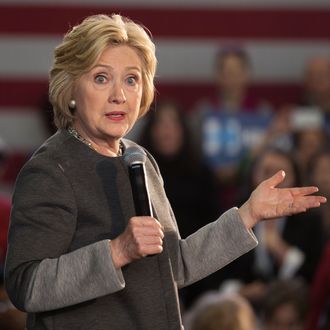
Until about a year ago, Bernie Sanders was a lifelong independent, a self-described “outsider” who often criticized the constraints of the two-party system. During his run for the Democratic nomination this year, he has conceded that his primary reason for joining the party was to ensure that his message about income inequality would receive broad media attention. Asked recently about whether he intends to lend his funding prowess to down-ballot Democrats, Sanders said, “We’ll see.” So when Politico’s Glenn Thrush asked Clinton whether Sanders is a Democrat on Tuesday, her uncertain reply was understandable.
“Well, I can’t answer that,” Clinton said. “He’s a relatively new Democrat, and, in fact, I’m not even sure he is one. He’s running as one. So I don’t know quite how to characterize him.”
It makes sense that Clinton isn’t sure if Sanders is a Democrat. But she needs to do everything in her power to make sure that he is one. Despite his independent label, Sanders has been a member of the Democratic caucus and a reliable vote for the Democrats throughout his time in Congress. He likens his political philosophy to that of Franklin Roosevelt. Ideologically, there is little distinguishing Sanders from Elizabeth Warren or Sherrod Brown: He should feel comfortable in today’s Democratic Party. More critically for Clinton, his supporters should. In Wisconsin last night, Sanders once again notched a double-digit victory on the strength of his support among independents. Clinton needs to keep those left-leaning voters in the Democratic fold.
On MSNBC’s Morning Joe Wednesday, Clinton may not have advanced that goal. Asked whether she believes Sanders is qualified for the presidency, Clinton declined to say that he is. The Vermont senator has been widely criticized this week for some clumsy answers in an interview he gave to the New York Daily News editorial board. Specifically, when asked to describe the mechanics of his plan to break up the big banks — one of his campaign’s signature issues — Sanders appeared ignorant and/or uncertain in the eyes of many pundits.
Daily News: Okay. Well, let’s assume that you’re correct on that point. How do you go about doing it?
Sanders: How you go about doing it is having legislation passed, or giving the authority to the secretary of treasury to determine, under Dodd-Frank, that these banks are a danger to the economy over the problem of too-big-to-fail.
Daily News: But do you think that the Fed, now, has that authority?
Sanders: Well, I don’t know if the Fed has it. But I think the administration can have it.
Daily News: How? How does a President turn to JPMorgan Chase, or have the Treasury turn to any of those banks and say, “Now you must do X, Y and Z?”
Sanders: Well, you do have authority under the Dodd-Frank legislation to do that, make that determination.
Daily News: You do, just by Federal Reserve fiat, you do?
Sanders: Yeah. Well, I believe you do.
“The core of his campaign has been ‘break up the banks,’” Clinton told MSNBC Wednesday morning. “And it didn’t seem, in reading his answers, that he understood exactly how that would work under Dodd-Frank, exactly who would be responsible, what the criteria were. And so that means you can’t really help people, if you don’t really know how to do what you are campaigning, to say that you want to do.”
Asked if Sanders’s lack of understanding is disqualifying, Clinton said, “Well, I think he hadn’t done his homework. And he’d been talking for more than a year about doing things that he obviously hadn’t really studied or understood.”
There’s little question that Clinton has proven herself more eloquent on a broad range of policy areas than her rival. But the Roosevelt Institute’s Mike Konczal, who has criticized Sanders’s Wall Street reform plan for its inattention to shadow banking, argues that the senator’s answers in the Daily News interview were perfectly sound and in keeping with the detailed plan he articulated earlier in the campaign.
Konczal says Sanders is basically correct in asserting that his administration would have the authority to declare that a given bank should be broken up. The Dodd-Frank reform gives the Financial Stability Oversight Council, a body of regulators chaired by the Treasury secretary, the power to declare large firms to be systemic risks in need of downsizing. And while Sanders’s simultaneous references to breaking up the banks through legislation, through the order of the Treasury secretary, and through the Federal Reserve may sound contradictory, they reflect his three-pronged plan for financial reform, which Konczal summarizes as follows:
1. Pass a law putting some sort of cap on the size of the balance sheet of financial companies, usually non-deposit liabilities. Caps, such as Senator Brown’s SAFE Banking Act, are generally proposed around 2 or 3 percent of GDP.
2. Have the council of regulators known as the Financial Stability Oversight Council (FSOC), on which the Treasury Secretary serves as chair, declare the largest firms to be too risky and must be broken up (Section 121).
3. Have the Federal Reserve, along with the FDIC, determine that the “living wills” of the biggest banks, which are plans on how they can fail without bringing down the economy, are not credible, and thus must be broken up (Section 165d).
Sanders hasn’t shown much talent for reciting the details of policy extemporaneously. That’s certainly a weakness for a politician, and one that can inspire reasonable doubts about the precision of his policy thinking. (His remarks on drones and trade in the Daily News interview buoy such doubts.) But it isn’t true that Sanders has failed to articulate a plan to do what he says he will to those big banks.






























